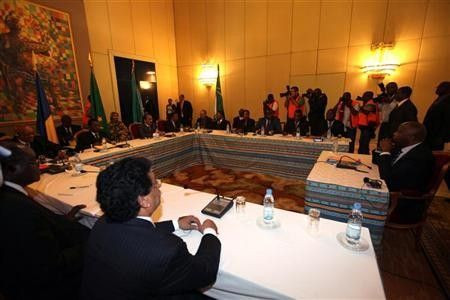Threats force ECOWAS out of Ivorian mediation trip

West Africa's regional body ECOWAS said on Tuesday it was unable to join an African Union mission to mediate in Ivory Coast's power struggle due to threats of violence against it.
A high-level African Union panel was due to meet presidential claimant Alassane Ouattara on Tuesday. But the absence of the ECOWAS chief and the president of Burkina Faso highlighted the difficulty of forging a united African position on the crisis.
Ouattara has been almost universally recognised abroad as winner of a November 28 election but incumbent Laurent Gbagbo, whom the AU met on Monday, has refused to step aside despite economic and political isolation that has crippled the top cocoa grower's economy.
The commercial capital Abidjan seemed calm on Tuesday, after at least six people were killed on Monday and residents reported large explosions overnight. Some 300 people have been killed since the poll and cocoa prices have hit 32-year highs, largely on the unrest.
ECOWAS said Burkina Faso's President Blaise Compaore and James Victor Gbeho, president of the ECOWAS commission, did not join the presidents of South Africa, Chad, Mauritania and Tanzania on their mission due to security threats from Gbagbo supporters.
His Young Patriots have threatened to prevent Compaore, previously an Ivorian peace broker but seen to be pro-Ouattara by Gbagbo's camp, from landing in the country.
Even though the threat was serious enough to compel (Compaore) to cancel his planned participation ... the ECOWAS Commission became concerned that the Panel nevertheless took the decision to go ahead immediately with the visit without the participation of an important member, ECOWAS said.
ECOWAS said it would continue cooperation with the AU panel, but it wanted to make it clear that it cannot accept that the situation in Abidjan was conducive for such a critical mission and it would evaluate the work of the remaining members.
No public statement has been made on the talks.
West African leaders have taken a firm line with Gbagbo, who lost the election, according to U.N.-certified results, and threatened to oust him if he does not stand down. The threat has irked other African leaders, who have sought further dialogue.
CALM ON TUESDAY
The November 28 election was meant to bring stability after a 2002-3 war and the subsequent years of economic and political stagnation. But it has instead deepened divisions and raised the spectre of renewed conflict.
At least six people trying to protest against Gbagbo were killed by the security forces on Monday, witnesses said. Ouattara's camp said the toll was double that, including three supporters killed by a rocket-propelled grenade.
Things are calm this morning. People are going out. Taxis are running, said Fatou Coulibaly, a resident of Koumassi, an Abidjan neighbourhood that saw the worst of Monday's violence.
Last night we were scared when we heard explosions. But we don't know who was shooting at who, Coulibaly added.
In a further sign he is digging in, and with February salaries due soon, Gbagbo's government said it would proceed with the opening of two nationalised French banks later this week.
Gbagbo's camp has earmarked the Ivorian branches of Societe Generale and BNP Paribas, two of a host of foreign banks to have suspended operations amid the crisis, for nationalisation.
The two presidential rivals have formed opposing, parallel governments, with Gbagbo retaining the support of the military, for now. Ouattara is backed by rebels controlling the north but restricted to a lagoon-side hotel protected by a ring of U.N. peacekeepers.
© Copyright Thomson Reuters 2024. All rights reserved.





















